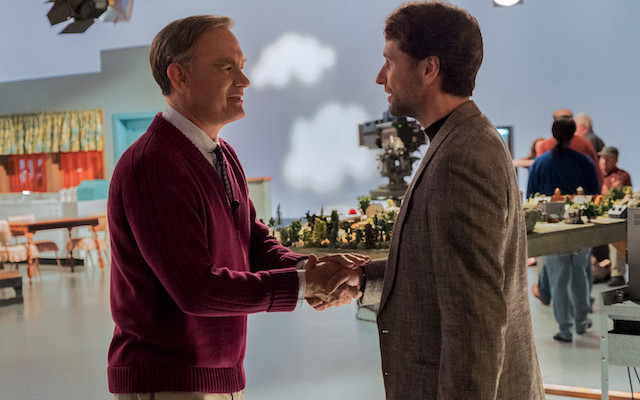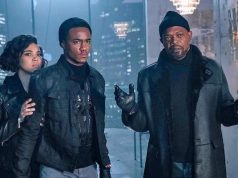
Coming on the heels of last year’s documentary “Won’t You Be My Neighbor?,” the unabashedly adoring Mister Rogers story “A Beautiful Day in the Neighborhood” puts us at risk of deifying the Presbyterian-minister-turned-TV-host. Frankly, I can’t think of anyone in American culture more deserving of the honor. As nearly every other hero has turned out to have a dark side, some grievous flaw or hypocrisy, Mister Rogers remains smudge-free. By every account of everyone who knew him, he was exactly as caring, compassionate, honest, and gentle as he was on “Mister Rogers’ Neighborhood,” where he taught millions of children valuable life lessons.
This comes across beautifully in the film, which is loosely based on Tom Junod’s 1998 Esquire article and directed by Marielle Heller, who had the obvious good sense to cast Tom Hanks as Fred Rogers. The casting is perfect, not because Hanks does a perfect imitation of Rogers (it’s more of an adaptation) but because Hanks is the closest thing to a Mister Rogers-like saint currently to be found in Hollywood. A beloved star for almost 40 years, Hanks has settled nicely into his role as America’s Dad, always there with his happy smile and twinkling eyes to reassure us that old-fashioned uprightness is still in fashion. We would kind of love to see him play a villain someday, but at the same time, no we wouldn’t.
Rogers is actually not the main character in “A Beautiful Day in the Neighborhood,” and the movie isn’t a biopic. Rather, it’s about a cynical Esquire journalist named Lloyd Vogel (Matthew Rhys) whose initially skeptical interactions with Rogers help him overcome the anger and bitterness in his own life. That sounds unbearably saccharine, and the fact that the screenwriters, Micah Fitzerman-Blue and Noah Harpster, were also responsible for the useless “Maleficent: Mistress of Evil” gives one pause. But Heller — whose last film, “Can You Ever Forgive Me?,” was a grittier portrait of a jaded writer — seems keenly aware of the dangers here and gives the film a down-to-earth feel, tinging it with melancholy and even a bit of weirdness as we consider what a burden it must be to have everyone expect you to be perfect all the time.
Lloyd, a new father with his wife, Andrea (Susan Kelechi Watson), has issues with his own father, Jerry (Chris Cooper), who abandoned the family when Lloyd’s mother was dying and has now reappeared wanting forgiveness. When Lloyd interviews Fred on the Pittsburgh set of his TV show, Fred spots his inner pain immediately and begins to gently coax it out of him. He does this simply by being himself: a positive-thinking pastor who genuinely loves every person he encounters. When he asks about Lloyd’s wife and Lloyd says her name is Andrea and they’ve been married for eight years, Mister Rogers says, “That’s a wonderful accomplishment. I would love to meet her someday” — and you can tell he means every word of it. He does meet her later, and sure enough, he is delighted to make her acquaintance.
That sincere niceness was the key to Fred Rogers’ life and the key to Hanks’ performance. The film begins with an episode of “Mister Rogers’ Neighborhood,” Hanks singing the song, putting on the sweater, changing the shoes, and so forth before sliding into the topic of today’s show: forgiveness. Just seeing Hanks in bushy Mister Rogers eyebrows and hearing that kind, soothing voice coming out of him (ASMR for Generation X and their kids) was enough to bring me to tears — and I never even watched the show. You know pure goodness when you see it, and Hanks thoroughly conveys the goodness in Mister Rogers. The film ultimately has the same message as Rogers’ show: that it’s OK to have feelings, and that feelings can be channeled in the right direction. Isn’t that beautiful?
A- (1 hr., 48 min.; )





